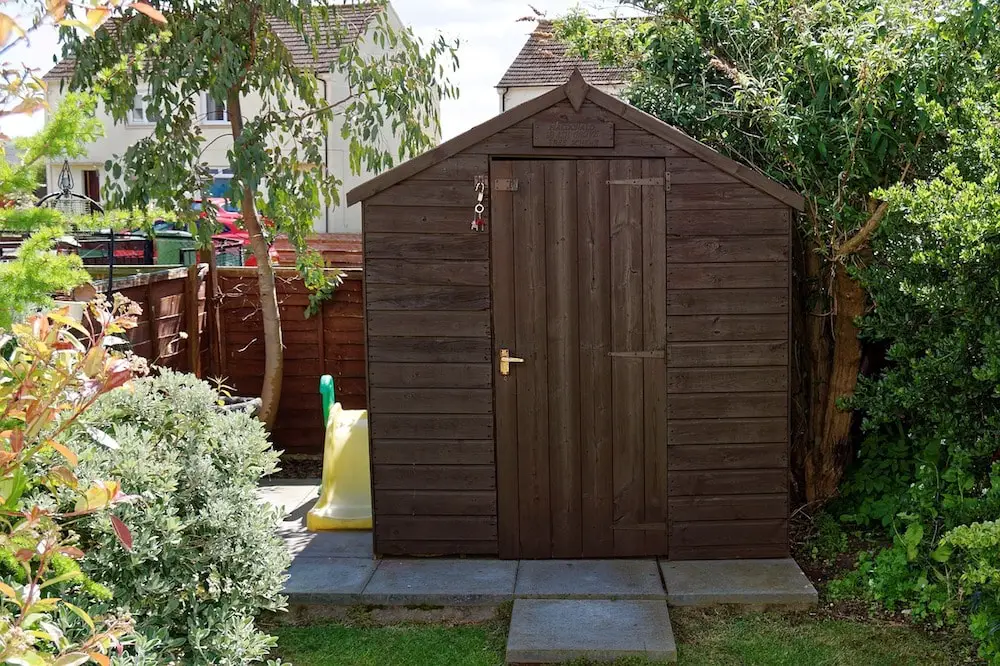
The standard homeowners insurance policy covers “unattached adjacent structures” at a percentage of the dwelling limit. Unattached adjacent structures is defined as sheds, outbuildings, inground pools, detached garages.
Sheds and outbuildings are covered for the same causes of loss, or perils, your home is.

Exclusions of a standard homeowners insurance policy
The homeowners policy is special form coverage, it covers perils not specifically excluded. Some of the exclusions are:
- Ordinance and law coverage – Bringing your outbuilding or shed up to code is excluded under the standard policy. You can purchase an endorsement for this coverage. If your shed is older, ordinance and law endorsement is great to have. Building code and ordinances change every year, as buildings age, it can be expensive to bring them up to code.
- Earthquakes and shockwaves – Earthquake coverage can be endorsed on to your homeowners policy or purchased separately. It is available in any state, but this coverage is most common in the western U.S. Remember that earthquakes can happen anywhere, though!
- Sinkholes, landslides, and mudflows – Any kind of earth movement is excluded from the homeowners policy, whether from earthquake or landslides and sinkholes. You can purchase coverage for mudflows and landslides through the flood insurance program, and sinkhole coverage is available in some states. Consider the terrain where you live when thinking about this coverage.
- Flood – Flood damage is excluded from the homeowners policy. If you purchased flood insurance for your home, you can cover your outbuildings on that policy. 90% of floods happen outside of flood zones, and outbuildings have shorter foundations than your home making them more flood-prone.
- Sewer back-ups and water that seeps through the foundation – An endorsement can be added to protect your outbuilding from sewer backup and seeping water. Even if you do not have any plumbing in your outbuilding, seeping water coming up from the ground or a septic tank overflow would be excluded without this endorsement.
- Power failure – Damage due to power failure is excluded. There is a small endorsement that covers loss of refrigerated or frozen property, but unless your outbuilding is a walk-in freezer this exclusion is not an issue for most people.
- Neglect or failure to maintain your property – In your policy contract, you are agreeing to maintain your property to the standards of a reasonable and prudent person. Maintenance issues are not covered in the home policy!
- War, nuclear hazard, governmental action – These exclusions do not affect us here in the United States often. If the nuclear reactor near your home melts down, you probably will not care that your shed needs repair.
- Intentional acts of the insured – Damage that you or your resident family members cause is excluded from the policy. Accidents such as backing into your shed or your child hitting a baseball through the window are excluded under this as well.
Anything other than the exclusions in your policy is covered.
Dwelling Coverage
The amount of included coverage for sheds and outbuildings is 10% of your dwelling coverage. If you have $200,000 coverage on your home your shed is automatically covered for $20,000.
You can increase the amount of dwelling coverage with your agent if you need to. The coverage for your outbuildings needs to cover all your outbuildings, fences, pool – anything not attached to your home needs to be included in this limit.
If you have inflation guard endorsement on your policy, the amount covered for your home and outbuildings will automatically increase. If you do not have this endorsement remember to talk to your agent annually to update the coverage amount!
How About What’s Inside My Shed?
The contents of your building are covered under your contents coverage on the policy. Only the structure itself is covered under the outbuilding coverage. The amount covered for contents is 40% if you are covered for actual cash value or 70% if you have the replacement cost endorsement.
Your contents coverage, whether in your home or in your outbuilding on your property is covered for 16 named perils:
- Fire or Lightning
- Windstorm or Hail
- Explosion
- Riot or Civil Commotion
- Aircraft
- Vehicles
- Smoke
- Vandalism or Malicious Mischief
- Theft
- Volcanic Eruption
- Falling Objects
- Weight of Ice, Snow, or Sleet
- Accidental Discharge or Overflow of Water or Stream
- Sudden & Accidental Tearing Apart, Cracking, Burning, or Bulging
- Freezing
- Sudden & Accidental Damage from Artificially Generated Electric Current
The items you store in your outbuilding are covered only if they are damaged by one of these named perils. If you store clothing or items that can be damaged by animals or insects, those claims would not be covered under your homeowners policy.
If you use the outbuilding for business, such as a running a small garage or as an office for an accounting service, there may not be coverage. Structures used for business use are excluded on the homeowners policy.
Contents in the outbuildings that is used for business use is limited on the policy. Depending on the type of contents it is, the limits range from $500 – $2000.
In most cases, yes, your shed is covered on your home insurance policy.

